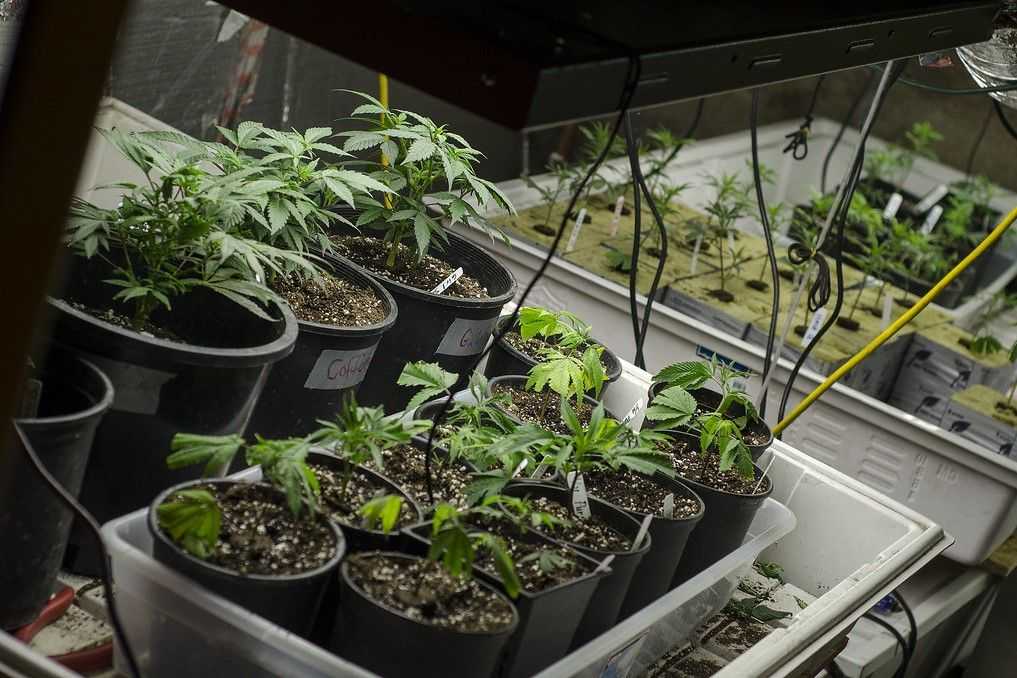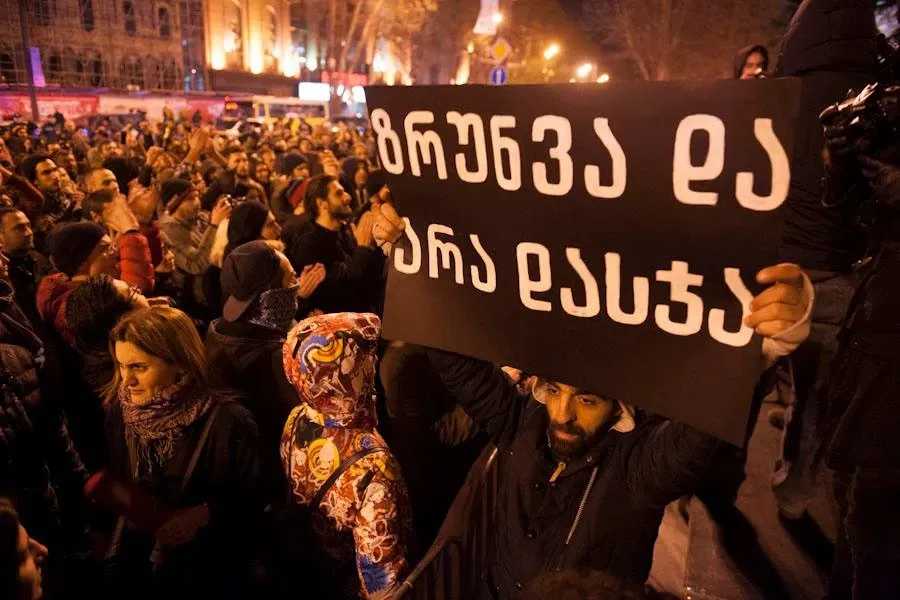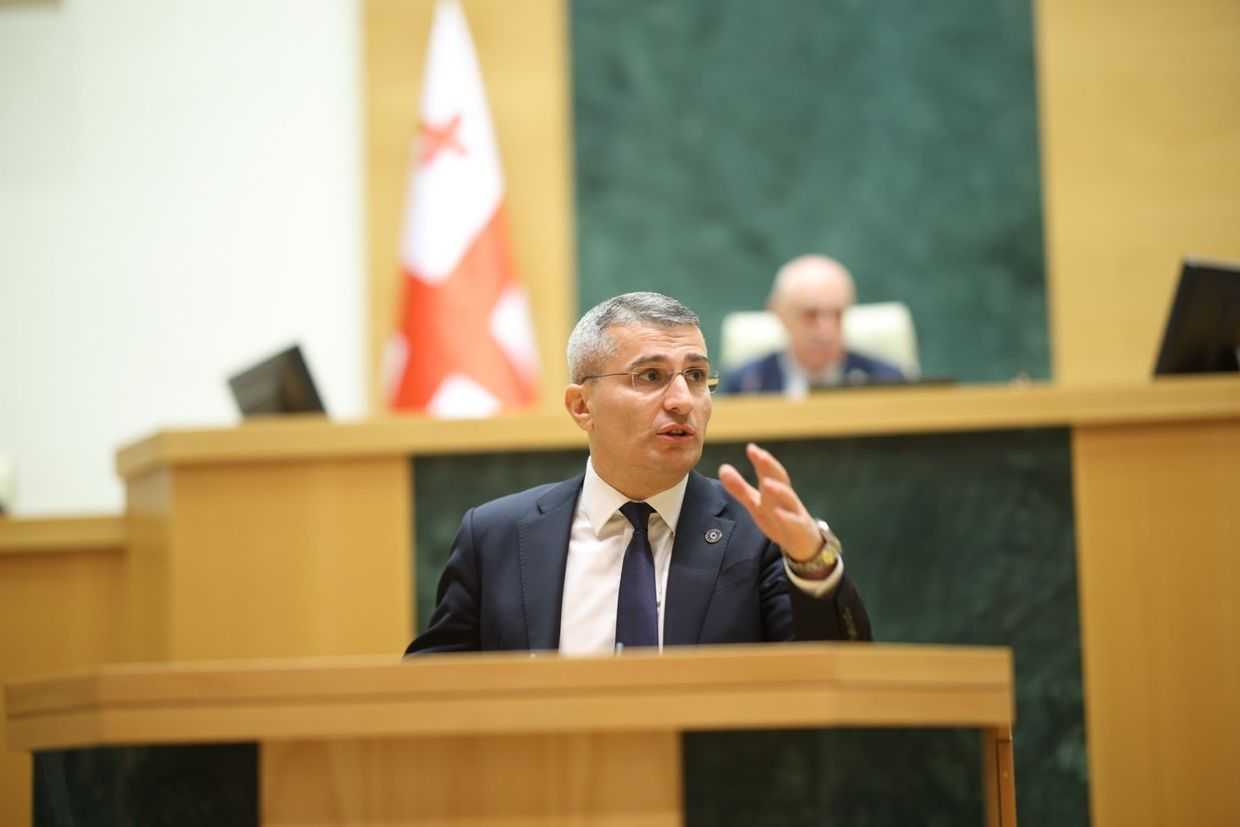
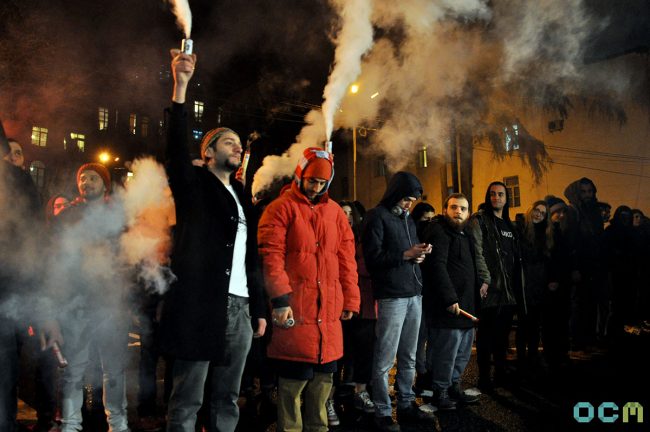
 Hundreds of demonstrators took to the streets on 25 January to protest the conviction of actor Giorgi ‘Bakhala’ Giorganashvili on drugs charges. Tbilisi City Court sentenced Giorganashvili, who claimed police planted drugs on him, to eight years in prison.
Hundreds of demonstrators took to the streets on 25 January to protest the conviction of actor Giorgi ‘Bakhala’ Giorganashvili on drugs charges. Tbilisi City Court sentenced Giorganashvili, who claimed police planted drugs on him, to eight years in prison.
Demonstrators gathered outside the Georgian Parliament in Tbilisi in a rally organised by up to 15 local organisations and activist groups, including drug policy advocacy group the White Noise Movement.
Giorganashvili was arrested on 25 January 2017 for ‘possession of 0.3726 grammes of buprenorphine’, an opioid used to treat opioid addiction, while travelling from western Georgia to Tbilisi.
[Read more about Bakhala’s case on OC Media: Actor released on bail in Georgia faces at least 8 years in prison on drug charges]
Demonstrators were demanding Giorganashvili’s immediate release, with many insisting on his innocence, and calling for reform of in the country’s drug policy. Demonstrators were also demanding punishment for policemen who they accuse of planting drugs on Giorganashvili.
A number of prominent figures attended the rally. Georgian poet Paata Shamugia addressed demonstrators saying the court’s sentence of 8 years in prison was ‘cruel’.
Protest in #Tbilisi demanding release of the actor sentenced to 8 years in prison on drug charges #drugpolicy https://t.co/1rM2PqPskE
— Dato Parulava (@dato_parulava) January 25, 2018
‘The court arrested every innocent, honest, and law-abiding person by sentencing Bakhala’, Shamugia said.
Writer Lasha Bughadze expressed concern regarding trust towards the state.
‘The system tells us to trust it — to trust this ugly, unauthoritative system and not trust the people. Why should we trust it, did they earn the trust?!’, Bughadze said.
The Prosecutor’s Office announced on 23 January that they had launched an investigation into allegations police fabricated evidence in the case.
Several hours ahead of the demonstration, the Public Defender Nino Lomjaria issued a statement saying ‘Giorganashvili’s case is a good illustration of harsh and repressive regulations in the Georgian Criminal Code regarding drugs’.
She said that the 8-year minimum sentence for possession of 0.37 grams of buprenorphine, where there is no intention to sell, is disproportionately harsh.
She called on parliament to prioritise adopting reforms that have been proposed by the National Drug Platform, an umbrella of drug policy advocacy groups.
The demonstration has been criticised by some in government. Vano Zardiashvili, an MP from the ruling Georgian Dream party, told IPN that the bill proposed by the National Drag Platform will fail because it’s ‘written by White Noise Movement at the Bassiani club and provides very soft punishment for drug dealing’.
Searches without witnesses
Drug policy activists have claimed that a rule allowing courts to place a person in jail after hearing testimony only from police, without requiring a third party to be present during a search, has to be amended.
‘As in many cases in recent months, the only witnesses [of Giorganashvili’s drug-examination] are police officers. After detaining Bakhala, they examined him at a place with no cameras, and despite Giorgi’s demand to have a third party witness during the examination, they were the only ones present’, the organisers of the rally, the White Noise Movement, a group of drug policy activists, said on 13 July.
After Bakhala’s conviction on 25 January, Beka Tsikarishvili, a drug reform icon, threw a brick at the courthouse in protest, breaking a window.
‘I didn’t feel like I was throwing a brick at a court, but at injustice’, Tsikarishvili told Liberali. A court sentenced him to 15 days in jail for swearing, according to Liberali, and he still faces charges for ‘criminal damage’.
Demonstrators also demanded his release.
An online petition calling for President Giorgi Margvelashvili to pardon Giorganashvili has so far gathered almost 3,700 signatures.
‘War against the people’
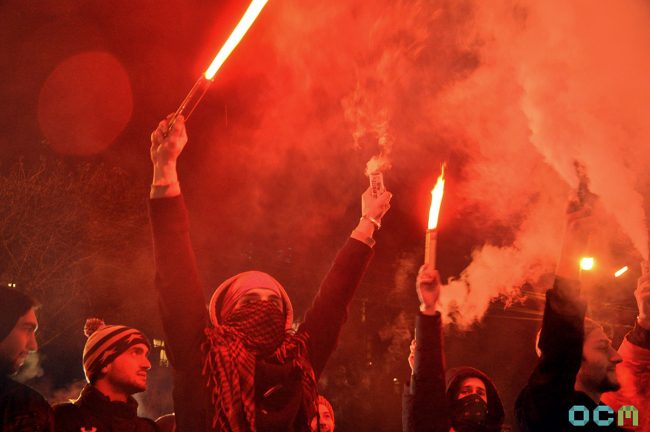
One of the key demands of the rally is to reform drug policy. Georgia, a country where every third prisoner is serving time for drugs, may be about to transform its strict drug policy into a far more liberal system. Activists and reformers are hoping that new legislation could change Georgia’s system away from what they call ‘the war against the people’.
[Read more about Georgian Drug Reform on OC Media: Georgia’s ‘war against the people’ and the war against a ‘system that stinks’]
A bill to decriminalise drug use has already made it to parliament. After its first hearing, the head of the Georgian Orthodox Church, Patriarch Ilia II, stressed the ‘importance of elaborating an anti-drug policy’. A number of leading figures in the government echoed the anti-drug messages in the Patriarch’s annual Christmas epistle.
‘As the country faces a demographic catastrophe, each of us has to be especially cautious and prudent in approaching this problem [drug use] in a complex way so that consequential steps are taken’, the Patriarch said in his epistle at midnight on 6 January, before Orthodox Christmas Mass.
The bill is currently on hold, as officials say there are multiple subjects they have to agree on. On 22 January, Justice Minister Tea Tsulukiani said there is no agreement on issues such as different charges for different quantities of drugs and for repeat offences.
She said that in four weeks time, ministries will present concrete details on how they think these issues should be addressed.




